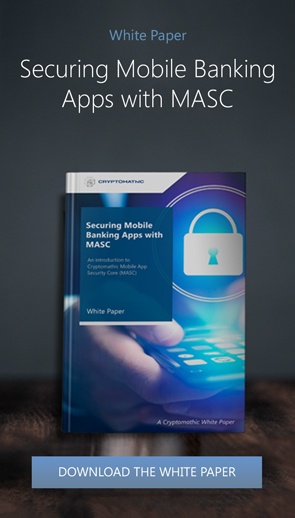7 min read
Top 10 Mobile App Security Threats and How to Protect Your Data
Carsten Lyngsoe : 30. May 2023
The ubiquity of mobile applications has made them part of our day-to-day lives, but with the increased use comes the risk of potential security threats. It is essential to be aware of these threats and take appropriate measures to safeguard your data and identity. In this article, we will take a look at the top 10 mobile application security threats and how you (as an app developer or user) can protect yourself from them through mobile application protection.
1. Malware attacks
Malware is code that harms a device or mobile app, usually to access private information. It can be spread through links, downloads, or apps and cybercriminals target it as millions of people download and rely on mobile apps daily.
Mobile malware poses a significant threat to the security of our devices and personal information. Cybercriminals are constantly searching for ways to exploit mobile apps, which have become prime targets due to their widespread usage. In their quest to infect as many devices as possible, attackers employ various tactics. They may create apps embedded with malicious code, inject harmful code into legitimate apps, or even create convincing replicas of popular apps to deceive unsuspecting users. Understanding how cybercriminals spread malware through mobile apps is crucial in safeguarding our devices and personal data.
2. Unsafe third-party APIs
APIs, or Application Programming Interfaces, enable seamless communication and data sharing between different apps. By integrating third-party APIs, mobile applications can enhance their functionality and provide additional services.
However, it's important to be aware that third-party APIs can pose significant security risks. Since they grant access to sensitive data, they become attractive targets for hackers seeking to exploit vulnerabilities.
To safeguard your app and its users' data, it is crucial to prioritize the security of the third-party APIs you integrate. Conduct thorough assessments to ensure the APIs adhere to robust security standards. Verify that they have implemented secure authentication systems and employ encryption to protect data transmission. By taking these precautions, you can mitigate potential security risks and improve mobile app protection.
3. Weak encryption
4. Data leakage
Data leakage occurs when sensitive information is transferred without authorization, typically due to inadequate security measures in an app. For example, if a user enters personal details like credit card information or their Social Security number into an app with weak security, this data can be stolen and exploited for malicious purposes. This security threat often arises from poor coding practices, outdated software components, or insufficient encryption of stored data.
While mobile apps are designed to protect your data, a lack of proper security measures can lead to data leaks. Cybercriminals can easily breach your app's database and gain access to any sensitive information stored within. Additionally, data leakage can occur even when an app is no longer in use or has been deleted, as the data may still remain accessible. It is crucial to prioritize robust security measures to prevent data leakage and safeguard your sensitive information.
Ensuring secure communication between your application and its server is paramount. This means that any data transmitted or received must be encrypted to prevent unauthorized access or manipulation by potential hackers. Unfortunately, many apps overlook the necessity of correctly securing their network connections, which can result in data breaches and various other security risks.
To mitigate these risks, verify that your app utilizes secure protocols for data transmission and employs robust encryption methods to safeguard the data it sends and receives. By doing so, you significantly reduce the chances of data exposure, fortifying the app's overall security stance.
Keeping your mobile app data safe
Mobile app protection is a critical element in the entire lifecycle of mobile app development. The increasing dependence on mobile apps for a wide range of tasks, from personal communication to financial transactions, has made them prime targets for potential cyber threats. Consequently, understanding and mitigating the primary mobile app protection threats is not just a good practice but a necessity.
Being vigilant about security threats can help you swiftly identify and manage major mobile app threats. This proactive approach ensures the safety of your data and apps, reducing the chances of successful cyberattacks. But vigilance alone is not enough. Developing an in-depth understanding of the potential threats, their implications, and preventative measures is vital.
Some common security threats include data leakage, unsecured Wi-Fi connections, insecure storage, insufficient cryptography, and poor session handling. Familiarity with these threats allows for the design of countermeasures to prevent them.
Moreover, secure coding practices play an important role in reducing vulnerabilities that might be exploited by hackers. Following guidelines and best practices in coding, regularly updating and patching your app, using encryption for data at rest and in transit, and adopting strong user authentication measures are all important steps in securing your app.
Additionally, consider using security testing tools and methodologies to identify any vulnerabilities that may exist within the app. Regular penetration testing and vulnerability assessments can highlight areas of weakness and enable you to address them promptly.
By dedicating sufficient time and resources to properly secure your mobile app, you significantly enhance its resilience against cyberattacks. This not only supports mobile app protection from cybercriminals and other malicious actors but also builds trust with your users, who can use your app with the confidence that their data is secure. In the long run, prioritizing mobile app security can lead to better user engagement, improved reputation, and ultimately, success in the digital marketplace.
Cryptomathic is an industry leader in mobile app protection, renowned for its innovative solutions that help businesses safeguard their applications. With years of experience in the field, Cryptomathic understands the complexities of mobile app security and delivers solutions that are designed to tackle a variety of cybersecurity challenges.
Read more about Cryptomathic's Mobile App Security Core or contact us to discuss your requirements

